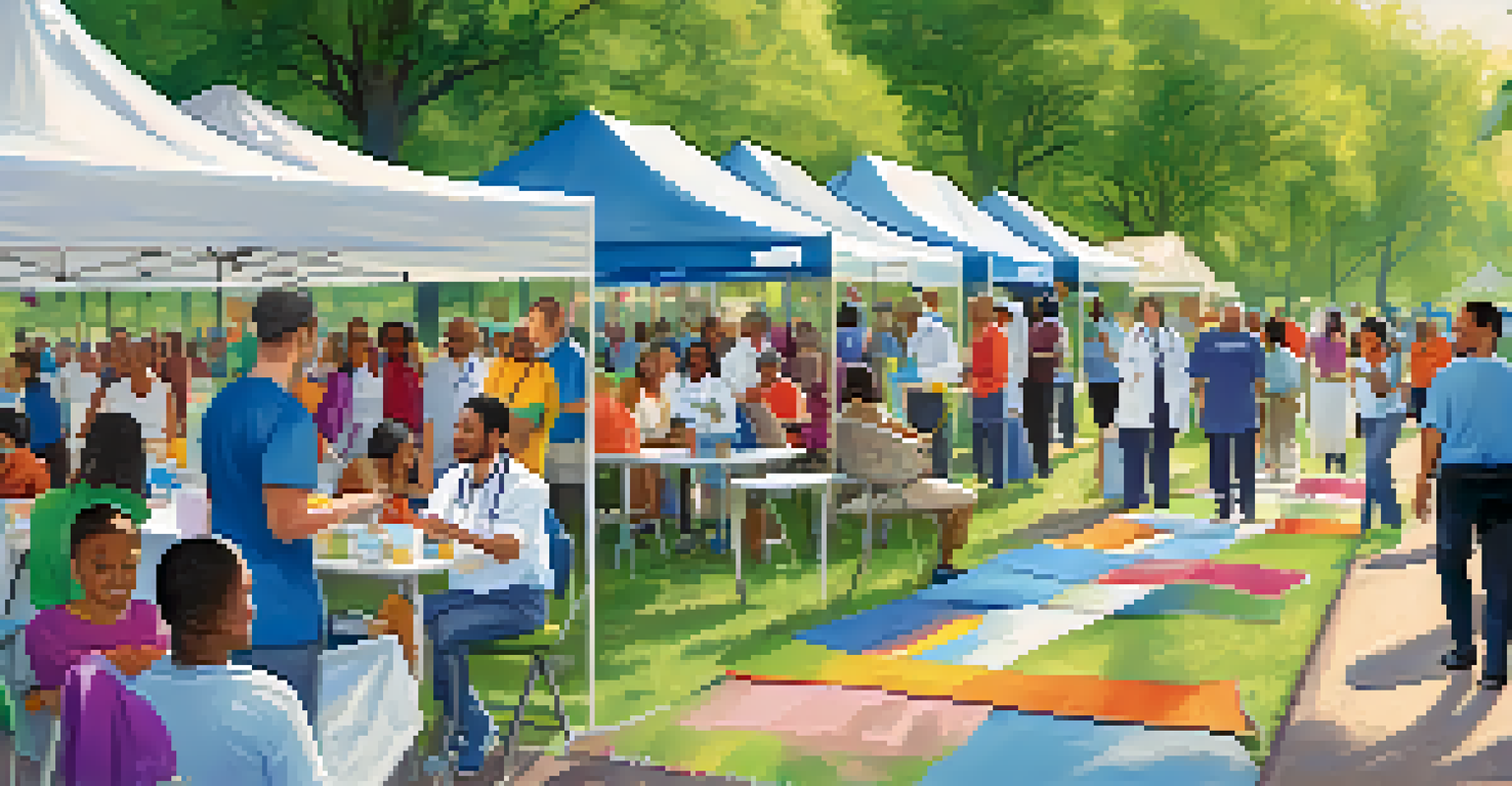Addressing Arizona's Access to Healthcare Services Challenges

Understanding the Current Healthcare Landscape in Arizona
Arizona's healthcare system is a mix of public and private providers, but many residents still face significant access challenges. Rural areas, in particular, suffer from a shortage of medical professionals, making it difficult for individuals to receive timely care. Additionally, socioeconomic factors often limit the ability of certain populations to access available services.
The greatest wealth is health.
The state's diverse geography contributes to varying levels of healthcare availability, with urban centers like Phoenix having more resources than remote regions. This disparity creates a gap where some communities are left underserved and vulnerable. Understanding this landscape is the first step in addressing the healthcare access issues faced by many Arizonans.
Furthermore, the ongoing evolution of healthcare policies at both state and federal levels can impact access. As policies change, it’s crucial for residents to stay informed about their options and the resources available to them. Only by recognizing these challenges can we begin to explore potential solutions.
Barriers to Healthcare Access in Rural Areas
Rural areas in Arizona often experience significant barriers to healthcare access, including a lack of nearby facilities and specialists. For many residents, traveling long distances for routine check-ups or emergency care can be a daunting task. This not only leads to delayed treatments but can also result in worsening health conditions over time.

Additionally, financial constraints play a critical role in limiting access for rural populations. Many families struggle with the costs of transportation and healthcare services, especially if they are uninsured or underinsured. As a result, individuals may choose to forgo necessary medical care, leading to more severe health complications down the line.
Healthcare Access Challenges in Arizona
Many residents, especially in rural areas, face significant barriers to accessing timely and adequate healthcare services.
The shortage of healthcare providers in these areas exacerbates these challenges. With fewer doctors and specialists willing to practice in rural settings, patients often find themselves waiting weeks or even months for appointments. Addressing these barriers requires innovative solutions that focus on increasing provider availability and enhancing transportation options.
Impact of Socioeconomic Factors on Healthcare Access
Socioeconomic status plays a pivotal role in determining an individual's access to healthcare services. In Arizona, low-income families often face multiple obstacles, including high insurance premiums, deductibles, and out-of-pocket expenses. This financial strain can dissuade them from seeking the care they need, even when services are available.
Health is not just about what you're eating. It's also about what you're thinking and saying.
Moreover, education and awareness also influence healthcare access. Many individuals may not fully understand their insurance coverage or the available healthcare options, leading to missed opportunities for preventative care. Bridging this knowledge gap is essential in empowering communities to take charge of their health.
In addition to financial and educational barriers, cultural factors can also affect healthcare access. Language barriers, differing health beliefs, and mistrust of the medical system can all contribute to reluctance in seeking care. Addressing these issues involves creating culturally sensitive outreach programs that resonate with diverse populations across Arizona.
The Role of Telehealth in Improving Access
Telehealth has emerged as a powerful tool in addressing healthcare access challenges, particularly in rural and underserved areas. By leveraging technology, patients can consult with healthcare providers from the comfort of their own homes, eliminating the need for long travel times. This shift not only saves time but also increases the likelihood of patients seeking care when they need it.
In Arizona, the adoption of telehealth services has surged, especially during the COVID-19 pandemic. Many providers quickly adapted to offer virtual consultations, making it easier for individuals to access care. However, it’s important to ensure that all residents have the necessary technology and internet access to fully benefit from these services.
Telehealth's Role in Access Improvement
Telehealth has emerged as a valuable solution for improving healthcare access, particularly for those in underserved regions.
While telehealth is a promising solution, it’s not without its challenges. Issues such as technology literacy and the need for in-person care for certain medical conditions still exist. Therefore, a balanced approach that incorporates both telehealth and traditional healthcare services is essential to meet the diverse needs of Arizonans.
Community Health Initiatives and Their Importance
Community health initiatives play a crucial role in addressing healthcare access challenges in Arizona. These programs often focus on outreach and education, helping individuals understand their health options and available resources. By engaging local populations, these initiatives can foster a sense of ownership over personal and community health.
One successful example is the establishment of mobile health clinics that travel to underserved areas, providing essential services such as vaccinations and screenings. These clinics not only improve access but also help build trust within the community. When residents see healthcare professionals coming to them, it can help bridge the gap that often exists between providers and patients.
Moreover, collaboration between local organizations, government agencies, and healthcare providers can amplify the impact of these initiatives. By pooling resources and expertise, communities can create comprehensive solutions that address the unique needs of their populations. Investing in community health initiatives is a vital step toward creating a more equitable healthcare landscape in Arizona.
Policy Changes Needed for Better Healthcare Access
Policy changes are essential for tackling the systemic issues surrounding healthcare access in Arizona. Advocates argue for the expansion of Medicaid and other programs to ensure more residents can secure affordable health insurance. By increasing coverage options, more individuals would have access to necessary medical services without the burden of overwhelming costs.
Additionally, policies that incentivize healthcare providers to practice in rural and underserved areas could help alleviate the shortage of medical professionals. This could include loan repayment programs or grants for those willing to dedicate their careers to these communities. Encouraging new graduates to consider these options is crucial for improving access to quality care.
Need for Policy Changes in Healthcare
Advocating for policy changes, such as expanding Medicaid and incentivizing providers in rural areas, is crucial for enhancing healthcare access.
Moreover, fostering a healthcare system that prioritizes preventative care can lead to better health outcomes and reduced costs in the long run. Supporting policies that emphasize wellness programs and routine check-ups can help catch health issues early, ultimately lessening the strain on emergency services and hospitals.
The Importance of Health Education and Advocacy
Health education and advocacy are vital components in improving access to healthcare services. By informing residents about available resources, insurance options, and preventative care, communities can empower individuals to take charge of their health. Educational programs can also address misinformation and cultural barriers that may hinder access.
Local organizations and stakeholders can play a significant role in advocating for healthcare rights, ensuring that all voices are heard in the policy-making process. Grassroots movements have the potential to influence change by highlighting the specific needs of their communities. Together, residents can push for policies that prioritize equitable healthcare access for all.

Furthermore, fostering partnerships between schools, community centers, and healthcare providers can enhance health education efforts. By integrating health education into various aspects of community life, residents are more likely to engage with their health and seek necessary care. Ultimately, a well-informed population is vital for creating lasting change in Arizona's healthcare landscape.